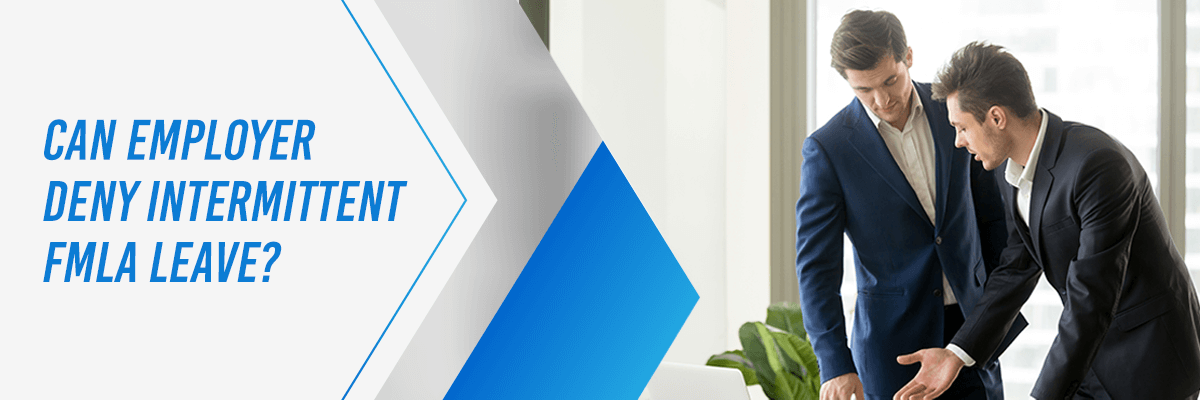The Family and Medical Leave Act (FMLA) allows eligible employees to take unpaid, job-protected leave for qualifying medical and family reasons. While FMLA provides flexibility, intermittent leave—where employees take leave in separate blocks of time, can sometimes create challenges for employers. This raises the question: Can an employer deny intermittent FMLA leave?
Let’s explore how intermittent FMLA leave works, when employers should be informed, what they must communicate, and the circumstances under which intermittent FMLA leave may be denied.



You can also explore our HR webinar page, where you’ll find sessions on topics such as FMLA, onboarding, hiring, and retention. Attending these webinars will enhance your knowledge and help you earn HRCI and SHRM credits, boosting your career as well. Let’s go back to the topic and discuss it.
How Does FMLA Intermittent Leave Work?
Intermittent FMLA leave allows eligible employees to take leave in increments rather than a continuous 12-week block. Here’s how it works:
How Is Intermittent FMLA Leave Calculated?
FMLA provides employees with up to 12 weeks (or 60 workdays) of unpaid leave per 12-month period. For intermittent leave, time off is deducted in increments corresponding to the shortest time period the employer uses to track absences (e.g., hourly, daily). If an employee works 40 hours a week, FMLA is calculated based on those hours.
How Long Is FMLA Intermittent Leave?
Intermittent FMLA leave lasts as long as the employee has FMLA-protected time available, but it must be supported by medical necessity. Some cases may require ongoing, periodic absences, while others might involve a gradual return to work.
What Conditions Qualify for Intermittent FMLA Leave?
Intermittent FMLA leave is granted for:
- Chronic serious health conditions (e.g., asthma, diabetes, migraines)
- Temporary incapacitating conditions requiring periodic treatment
- Recovery from a major surgery or illness
- Pregnancy-related medical needs
- Care for a family member with a serious health condition
For more details on FMLA eligibility rules and requirements, refer to our previous guide.
When Employers Should Be Informed About Potential FMLA Leave Requests
Employees must notify their employer at least 30 days in advance if the leave is foreseeable. In emergencies, they should inform their employer as soon as possible. Additionally:
- Employers can request medical certification to support the need for leave.
- Employees should provide updates regarding changes in their leave schedule.
- Failure to provide adequate notice can lead to delays or denial of leave approval.
What Employers Must Communicate About FMLA Leave to Employees
Employers must ensure employees understand their FMLA rights by:
- Posting a mandatory FMLA notice in the workplace.
- Providing an FMLA rights and responsibilities notice when an employee requests leave.
- Informing employees about their leave designation and approval status within five business days.
- Clarifying that intermittent FMLA leave must be medically necessary and used responsibly.
For more insights on FMLA compliance for employers, check out our previous article.
Situations Where Employers Can Deny Intermittent FMLA Leave
While FMLA generally protects intermittent leave, employers can deny it in specific circumstances:
1. The Employee Is Not Eligible
FMLA applies only if the employee has worked at least 1,250 hours in the past 12 months and the company has 50+ employees within a 75-mile radius.
2. The Leave Request Is Not Medically Certified
If the employee fails to provide medical documentation or submit the required certification on time, the employer may deny the request.
3. The Employee Fails to Follow the Employer’s Leave Policy
Employers can require employees to follow standard call-in procedures for absences. Failure to comply can result in leave denial.
4. The Request Is for a Non-Qualifying Reason
FMLA does not cover absences for mild illnesses, general doctor visits, or elective procedures. Employers can deny requests that do not meet the criteria for a serious health condition.
5. The Intermittent Leave Schedule Is Not Reasonable
If intermittent leave unduly disrupts operations, employers may work with the employee to find an alternative schedule. However, they cannot deny medically necessary leave outright.
For a deeper dive into what is considered an FMLA serious health condition, read our previous blog.
Conclusion: Measures for FMLA Compliance
To ensure compliance and reduce the risk of denied claims or disputes, employers should:
- Clearly outline FMLA policies in an employee handbook.
- Require complete and timely medical certifications for intermittent leave requests.
- Track and document FMLA usage to prevent misuse.
- Train HR staff and managers on handling FMLA requests fairly and legally.
- Address FMLA abuse by implementing consistent procedures.
For more information, read about common types of FMLA abuse and how employers can address them.
By staying informed and proactive, both employers and employees can navigate FMLA intermittent leave effectively while maintaining compliance with federal regulations.


